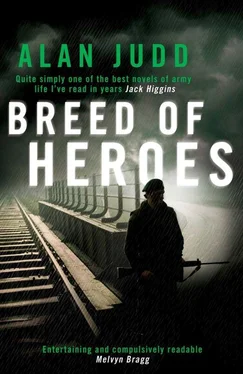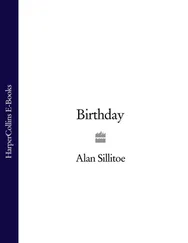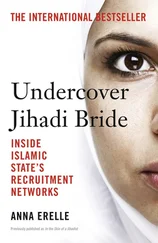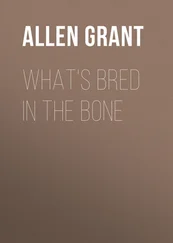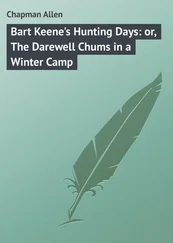Anthony now showed himself to be politic in a way that should have counted for more in the Army than it ever did. He expressed deep regret at the hot-headed and unauthorised action of an over-enthusiastic young officer, an ‘unfortunate young man’ in whom he had detected signs of stress only that day, and who would now be the subject of an enquiry. He then added that the only good thing to have come of the episode was that the ‘monastery dump’ had been found before it could be used by the Provisional IRA to kill people. Father O’Rourke, in denying that the monastery had had any knowledge of the arms, again stressed his sense of outrage and his conviction that the resulting publicity would be very bad for the perpetrators, and not the less so because they admitted to employing mentally unstable officers. Anthony accepted without hesitation that Father O’Rourke knew nothing of what his own monastery harboured in its vaults and speculated that if the monastery vaults were linked, however tenuously, to the Factory tunnels then the arms must almost certainly have come in from the outside. He hoped fervently that the resulting publicity would take account of this and would not implicate the monastery in any way with the storing of arms for the Provisional IRA, though he was, to be honest, more than a little pessimistic as to whether all sections of the community in Northern Ireland would see it like this. He further hoped that the Holy Mother Church would not be embarrassed by the publicity. Father O’Rourke shook his head and said that it was bound to be a bad business for everyone. Anthony said that at least the arms were out of the monastery now, almost as though they had never been in. Father O’Rourke sincerely wished they had not — if he had known about them and had known where to find Anthony he would certainly have told him. Anthony ventured to suggest that they had even been elsewhere. He was sure that it could so easily look as though they had been found in a tunnel beneath the Factory, which would solve everyone’s problems, though in order to substantiate this story the ‘unfortunate young man’s’ evidence could be crucial. Father O’Rourke wondered whether the unfortunate young man could be relied upon. Anthony was quite certain that he could. Father O’Rourke wondered whether it would be possible to do something about the monastery’s damaged gates. Anthony was quite certain that it would. Father O’Rourke thought it would be best if Anthony spoke to the young man in the privacy of the Factory, and added that he would be glad to be able to cast an eye over the copy of the press statement before it was issued.
And so agreement was reached. Charles was half hoping they would be taken down to retrieve Chatsworth from a cell deep in the earth but he was brought to Father O’Rourke’s study by two large and grizzled monks. He looked ragged and dirty and a little smaller than usual. His face and hands were still partially blackened and his trousers were torn. He forced an uncertain grin on seeing Anthony and Charles, which became a dying grimace as Anthony said sharply to him, ‘Where’s your beret?’
‘Back in the Factory,’ said Chatsworth.
‘I’ll speak to you about that later.’
The three of them left the monastery after courteous farewells between Anthony and Father O’Rourke. Charles noticed that Chatsworth was limping slightly. ‘Were the monks very rough with you?’ he asked.
‘Yes, very,’ said Chatsworth seriously. ‘And they used bad language too. And they pinched my kukri.’
‘Before you had a chance to use it or after?’
‘Before, unfortunately. Otherwise I might have got away. I shall put in a complaint.’
‘You’ll do nothing at all,’ said Anthony. ‘Being captured by monks brings disgrace upon the regiment. You’ll do nothing to advertise it.’
‘But we got the arms, didn’t we?’
‘Only through the timely intervention of Thoroughgood and myself. It’s lucky for you that we both happened to be present and sober.’
Chatsworth hobbled and skipped a little to keep up. ‘What’s going to happen to me, then? I was rather hoping for a medal.’
‘Quite the contrary. I haven’t decided yet, but you may lose your name.’
Chatsworth was silent. To lose one’s name and to be referred to by everyone by one’s number was a punishment normally given only to Sandhurst cadets and recruits under training. Chatsworth looked worried beneath the polish. Shooting would at least have been honourable.
The party was over when they got back to the Factory. The drink had run out and so the press had departed, though leaving one or two of their number as corpses on the ops room floor. There were a few Army casualties — ghostly survivors, it seemed, of some long-lost battle. Edward wandered about starkly staring, like one who had been too long in the wilderness, and was ignored by everyone. The body of Nigel Beale was said to be on view in the manhole in which the drink had been discovered. Half of Chatsworth’s platoon was missing, allegedly with Moira Conn. Beazely, remarkably sober considering his previous state though still not firing on all cylinders, as he put it, clutched her shoulder-bag. ‘Probably being rogered by the lot of them,’ he said. ‘She goes in for that now and again. It was the staff of the Europa last time. Good background stuff to this story but they won’t print stuff about other journalists. Have you ever noticed that? Dirt on everyone else but never journalists. S’pose we’re all clean-living. Any chance of some black coffee?’
The kettle was found and coffee was made for several. It was drunk from the same various containers as had served for the party. Charles told Beazely what had happened in the monastery. ‘This’ll make the story of the year,’ said Beazely. ‘I’ll leave out the drink, of course. We can make Chatsworth a national hero if you like.’
‘No,’ said Charles, ‘I’ll do this story.’
Beazely waved his hand. ‘Don’t worry, sport, don’t worry. I can handle this one myself. For once in my life I was the man on the spot. Anyway, it’s a big story. Needs a professional.’
Charles was tired enough not to be worried by niceties, whch had never really seemed appropriate with Beazely anyway. ‘It’s our story. We’ll handle it. I’ll write your report.’
‘Now come on, Charlie, that’s not how we do business, you and me. Fair’s fair, all by agreement, you know —’
‘D’you want to live?’ Beazely stopped speaking. ‘Because if you do you’ll do it my way. It’s Chatsworth, you see. He’s mad. You’ve seen that for yourself. Well, he’s convinced you betrayed him to the monks. No argument can shift him. You know what he’s like. And he’s got a knife. All he wants is anonymity, a chance to do good in secret. If you do this story and blow it up all over the place he’ll kill you. We can’t hold him back for ever. He’s an unguided missile. I’ll do a story which does you credit and doesn’t mention him. How about that?’
Ultimately any appeal to Beazely’s sense of self-preservation could be guaranteed to work. He argued but in the end the thought of being stalked for the rest of his life by a vengeful and murderous Chatsworth was more powerful than his pride. He was already convinced of Chatsworth’s madness and had been threatened by him once that evening when he had at first refused to drive the lorry. Chatsworth had tapped the kukri in its sheath and remarked that he never drew it without drawing blood.
Charles had to write three accounts of the incident that night. Van Horne had disappeared and, anyway, it would have been unwise to get him to help. One account was for the Brigade Commander, ghost-written on behalf of Anthony, which stated that the arms had been discovered in a tunnel connected with the Factory tunnels and which left vague the actual point where they had been found while implying that it was somewhere under the road. He then did a press statement which elaborated on this by saying that the Army had been moving the arms secretly after dark in order to avoid provoking trouble in the area of the monastery on a Sunday. The ploy had gone wrong when the driver of the lorry had been struck by a stone and had crashed his lorry outside the monastery gates. For Beazely he wrote a more dramatic account, beginning, ‘For seven hours I sweated in a rat-infested, booby-trapped IRA tunnel helping soldiers remove crates of deadly Armalites from under the noses of the terrorists. I was part of a specialist “digger” unit. .’
Читать дальше
